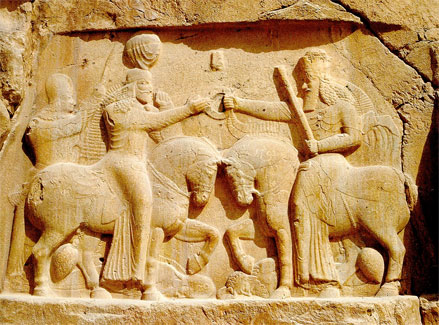The Restoration Covenant
Ralph Smith helpfully applies the five point Covenant model to the history of Israel between the captivity and Christ:
1) Transcendence: God’s sovereign control over the nations was revealed in this period of the old covenant more than any other. Daniel foresaw the whole history of the world from the time of Babylon to the time of establishment of the kingdom of the Messiah (Dan. 2:27ff.; 7:1ff.). Clearly the kingdoms of this world were in His hand and He was guiding history where He willed. For the Jews as a nation, this greater revelation of God’s Kingship was important for they would be apparently in the hands of unbelieving rulers through much of this period, but the fact that God had predicted the history of the entire era from the beginning put all of this in a different light. The Jews learned anew that “The king’s heart is in the hand of the LORD, as the rivers of water: He turneth it whithersoever He will” (Prv. 21:1).
2) Hierarchy: Civil rule had been taken from the Jews and given to the Gentile empires, but the Gentiles were appointed as protectors, not persecutors. So long as the Jews were faithful to God they would find Gentile rulers favored them above the other nations, as, for example, the king of Persia favored the Jews in the days of Ezra, Nehemiah, and Esther and Mordecai. The temple had a new priesthood examined and approved by Ezra (Ezr. 2:62). Jerusalem was rebuilt no longer as a civil power, but, what was far more important, the world center for the worship of the true God. Also, sometime near the beginning of this era, the scribes and the Pharisees apparently developed as a “prophetic” ministry of law experts to teach the people God’s word. In the beginning, they were, no doubt, faithful to God.
3) Ethics: The civil law given to Israel through Moses could no longer be applied in its literal fulness, for the Jews would have to conform to the civil ordinances of the ruling empire. The most obvious example of laws that had to change are the Mosaic regulations concerning the king, but other laws were affected, too. In some cases, this might include the definition of a crime, in other cases it may mean the imposition of a punishment different from that specified in the Mosaic law. We know, for example, that Jews under the Romans were not allowed to execute criminals and the sin idolatry would not have been defined as a crime against the State. Land laws, too, had to be modified, for after the return from the Exile not all families could prove their identity and, no doubt, many of the original families no longer existed. Add to that different boundaries, and clearly the division of the land in the days of Joshua would no longer be relevant. In sum, various modifications of the civil and social laws were required, but the essence of the law — the righteous requirement of the law — remained unchanged.
4) Oath: During this era the most conspicuous leaders of the nation were the prophets and teachers of Scripture — the scribes and pharisees. If these men were faithful to God, they would lead the nation in righteousness and the Gentile kingdom would show favor to the Jews, which is what we see, for example in the books of Ezra, Nehemiah, and Esther — God sovereignly led the kings of Persia to show special kindness to the Jewish people. The Jews would be blessed by God so long as they kept His law and submitted to the Gentile authorities He placed over them. During much of this era, however, the Jews were oppressed, not because of the Gentile empires’ wickedness, but because of their own unfaithfulness to God.
5) Succession: The Abrahamic promise of global blessing was not in any way hindered, but actually facilitated by the fact that the Jews were under the rule of Gentile empires. More than any other time in their history, Jews had opportunities for trade and travel, which spread the knowledge of God into Gentile lands. It is no coincidence that the reforms of world religions took place during this period. Changes in the religions of Greece, India, and other nations may well have been due, at least in part, to the influence of ambassadors sent by Daniel from Babylon’s court, traders from the Persian empire, and other Jews who brought the knowledge of the true God with them wherever they went.
But Paul complains that the Jews failed their mission as ambassadors for God’s kingdom: “Behold, thou art called a Jew, and restest in the law, and makest thy boast of God . . . Thou that makest thy boast of the law, through breaking the law dishonourest thou God? For the name of God is blasphemed among the Gentiles through you, as it is written” (Rm. 2:17, 23-24). By the end of this era, the Jews, rather than inheriting the world, had won for themselves ignominy because of their hypocrisy.
From The Covenantal Structure of the Bible by Ralph A. Smith


























